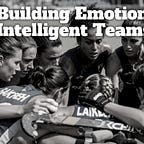Experienced field hockey coaches witnessed countless practices, strategized for every opponent, and celebrated hard-won victories. You understand the nuances of tactical play, physical conditioning, and individual skill development. But what if the true differentiator for sustained success, adaptability, and unwavering team cohesion lies not just in the perfect drag flick or defensive press, but in something far more profound: emotional intelligence at the team level?
You might be thinking, "I know what an emotionally intelligent player is, but a whole team?" This is precisely the question that renowned organizational psychologist and associate professor Vanessa Druskat, co-developer of the foundational concept of an emotionally intelligent team, addresses. Her research, which has influenced thousands of organizations and hundreds of thousands of teams, offers a powerful roadmap for building teams that aren't just good, but truly remarkable.
This isn't about fostering a "touchy-feely" atmosphere that distracts from the game; it's about leveraging the inherent human need for connection and understanding to unlock unprecedented levels of performance, resilience, and adaptability on and off the field.
The sources we built this on:
What is an Emotionally Intelligent Team? More Than Just Talented Individuals
Often, we assume that if we gather a group of highly skilled and individually emotionally intelligent players – those who are self-aware, empathetic, and have strong self-control – we’ll automatically create a high-performing team. However, Druskat's research clearly states: "just because you stack a team with emotionally intelligent people doesn't mean you get emotionally intelligent behavior".
Think of it this way: imagine a player with exceptional empathy. If they walk onto a team where disrespect is rampant, or individual contributions are ignored, their natural empathy might "go out the window". Their individual skills, personality, and attitudes aren't the primary predictors of team behavior in complex environments. Instead, the environment itself, shaped by the team's norms and routines, is a far better predictor.
An emotionally intelligent team, therefore, is one that intentionally builds an environment that fosters trust and psychological safety, cultivating relationships where positive and constructive emotion leads directly to higher performance. For a field hockey team, this means creating a culture where players feel safe to take risks, voice concerns, challenge ideas constructively, and support each other, knowing they are valued regardless of outcome.
The Foundation: The Unseen Power of Team Norms
At the heart of an emotionally intelligent team are its "norms". As Druskat explains, norms are simply "how we do it here" – they define the normal behavior within the team's environment. These are the routines and habits that dictate interaction.
Consider your team's unspoken rules:
Do players greet each other when they arrive at practice, or do they immediately get down to business without acknowledgment?
Is it acceptable to check phones during team meetings, or is full attention expected?
How do players respond when a teammate makes a mistake on the field – with frustration, or with immediate encouragement?
These seemingly small interactions collectively determine the team's level of motivation, how much players will speak up, and the types of things they'll feel comfortable saying.
Druskat, who has spent 30 years observing team cultures, describes herself as the "Jane Goodall of teams," meticulously documenting these interaction patterns. She found that these norms are what truly differentiate the highest-performing teams from average ones.
The Involuntary Need to Belong: Why Norms Matter So Much
The power of norms stems from a fundamental, often unconscious, human social need: the "need to belong". This isn't a negotiable need; it's involuntary and universal, affecting everyone regardless of personality or background, as confirmed by neuroscience.
To truly belong, individuals need to feel genuinely accepted, known, understood, valued, and supported. When this need isn't met – when players feel ignored, invisible, or irrelevant – it significantly reduces their participation and stifles creativity. Instead of offering their best, players may conform to avoid standing out, even if they have valuable insights or "crazy ideas" that could benefit the team. Your brain is literally wired to help you fit in, sending "error messages" when you're about to disagree with someone of status.
In field hockey, this manifests in many ways:








